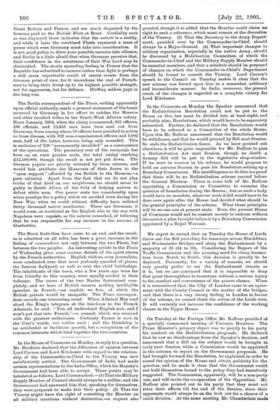In the House of Commons on Monday, in reply to
a question, Mr. Brodrick declared that the difference of opinion between Lord Curzon and Lord Kitchener with regard to the relation- ship of the Commander-in-Chief to the Viceroy was now satisfactorily settled. The Government of India had made certain representations to the India Office, which his Majesty's Government had been able to accept. These points may be tabulated as follows. Lord Curzon asked :—(1) That the Military Supply Member of Council should always be a soldier, and the Government had answered him that, speaking for themselves, they were prepared to make this their policy. (2) That the Viceroy might have the right of consulting the Member on all militaiT questions without distinction.—a request also
granted, though it is added that the Member could claim no right to such a reference, which must remain at the discretion of the Viceroy. (3) That the Secretary to the Army Depart- ment, presided over by the Commander-in-Chief, should always be a Major-General. (4) That important changes in military organisation, especially in the native Army, should be discussed by a Mobilisation Committee, of which the Commander-in-Chief and the Military Supply Member should be essential members, and that a schedule should be prepared of changes on which the Commander-in-Chief's Department should be bound to consult the Viceroy. Lord Curzon's speech to the Council on Tuesday makes it clear that the new scheme was forced upon him in a somewhat arbitrary and inconsiderate manner. In India, moreover, the general result of the changes is regarded as a complete victory for Lord Kitchener.


































 Previous page
Previous page